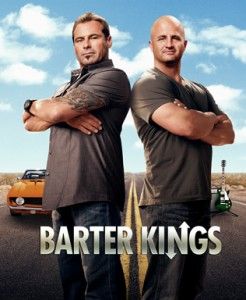Barterers Beware: Taxman wants his take
By John Hrabe
A&E’s “Barter Kings” make trading look easy.
In one recent episode, professional traders Antonio Palazzola and Steve McHugh started with a beer-making kit, and through a series of transactions, ultimately walked away with a food truck.
“This is a cashless society, everybody’s open to it, you just have to figure out why and how,” McHugh told his hometown paper in an interview last year. “It’s a great way to do things.”
With a depressed economy, more people are giving up buying new in favor of trading what’s old. The International Reciprocal Trade Association, the trade association for traders, estimates that as many as 400,000 companies exchange up to $4 billion worth of goods annually.
But, before down-and-out Californians try their hand at non-monetary trading, barterers beware. Money might not change hands but that doesn’t mean the exchange is exempt from state sales and use taxes.
“Simply trading your own property with someone else without being registered could lead to big trouble with the tax collector,” warned Board of Equalization member Michelle Steel, whose office helps taxpayers and small businesses navigate the state’s confusing web of tax laws. “These complex and rarely mentioned laws create serious pitfalls for Californians who are caught unaware.”
State law
Barterers who don’t collect sales taxes could be running afoul of state law. That’s because state law doesn’t differentiate between monetary and non-monetary transactions for purposes of sales and use taxes. To better understand the tax implications of bartering, I reached out to my former colleagues at the state’s sales tax board to help explain the rules.
“A ‘sale’ and ‘purchase’ includes bartering under the Sales and Use Tax Law,” confirmed Jaime Garza, deputy director of external affairs at the Board of Equalization, which collects more than $53.7 billion annually in taxes and fees. “Sales tax is due on items that are bartered, and generally would be calculated based on the amount agreed upon between the parties or the fair market value, whichever is greater.”
And you don’t have to be a frequent trader to be subject to California’s strict tax laws. If you make as few as three transactions per year, you’re legally obligated to comply with the state’s sales tax regulations.
“There is no threshold for the number of bartering transactions per year,” Garza said. “Generally, if you make three or more sales, including bartering, in a 12-month period, you are required to hold a seller’s permit, collect sales tax, and send it in to the BOE.”
The High Desert’s “Barter Kings” hit that three trade sales threshold in almost every episode. In the series premiere, according to Entrepreneur Magazine, “the pair worked their way up in a series of six trades from a framed gold Elvis record to a powerboat.” Yet, the show never records the traders collecting sales tax or displaying their seller’s permit.
Due to taxpayer confidentiality, the Board of Equalization would not comment on whether the cable reality show is complying with state tax law. There’s reason to believe that the professional barterers are fully aware of the state’s tax laws. McHugh and his wife, Cindy, own Express Super Pawn, a Hesperia pawn shop that is rebranded as “Express Trade” for the reality show. Pawn shops are one of the most heavily scrutinized retailers in the country because of the increased potential to deal in stolen merchandise.
Hypothetical example
While it’s unlikely that the Board of Equalization would launch a formal investigation into occasional traders, small businesses should be careful because a trade might become a side complication during an audit. The “Barter Kings” Hollywood treatment of bartering could get California copycats into trouble — which is why the tax agency offers this hypothetical example for how to tax trades.
“For example, assume that you are a retailer of electronic equipment and owe $500 for dental care. In place of cash, you provide a television set from your inventory as full payment. The transaction is considered a taxable sale, and you must report and pay tax based on the $500,” Garza explained.
Of course, many barterers are trading goods precisely because they lack cash. If forced to pay additional taxes out-of-pocket, it might not be worth making the trade.
“Sales price, in many barter transactions, is a subjective, non-monetary value, based on the need or desire each person has for the items that are up for trade,” Steel argues. “Someone may be willing to trade a jacket for a vintage record, but they may not be willing to pay $30 for the same item.”
In the long run, the state should update the tax laws to grant a specific exemption for occasional traders, if for no other reason than to avoid the paperwork nightmare.
“It’s never too soon to start bartering!” the “Barter Kings” encourage on their Facebook page. Well, technically, make sure to get a seller’s permit first.
Related Articles
Sen. Lieu And The River Called Denial
Commentary MAY 19, 2011 By STEVEN GREENHUT California’s fiscal problems are only front-page national news thanks to the state’s structural
Fired official slams state 'fire sale'
APRIL 16, 2010 By KATY GRIMES A complex administration plan to sell state-owned properties and then lease them back from
Budget For A Paycheck?
JUNE 14, 2011 By KATY GRIMES Commentary If you were presented with doing your job or having your paycheck withheld,



